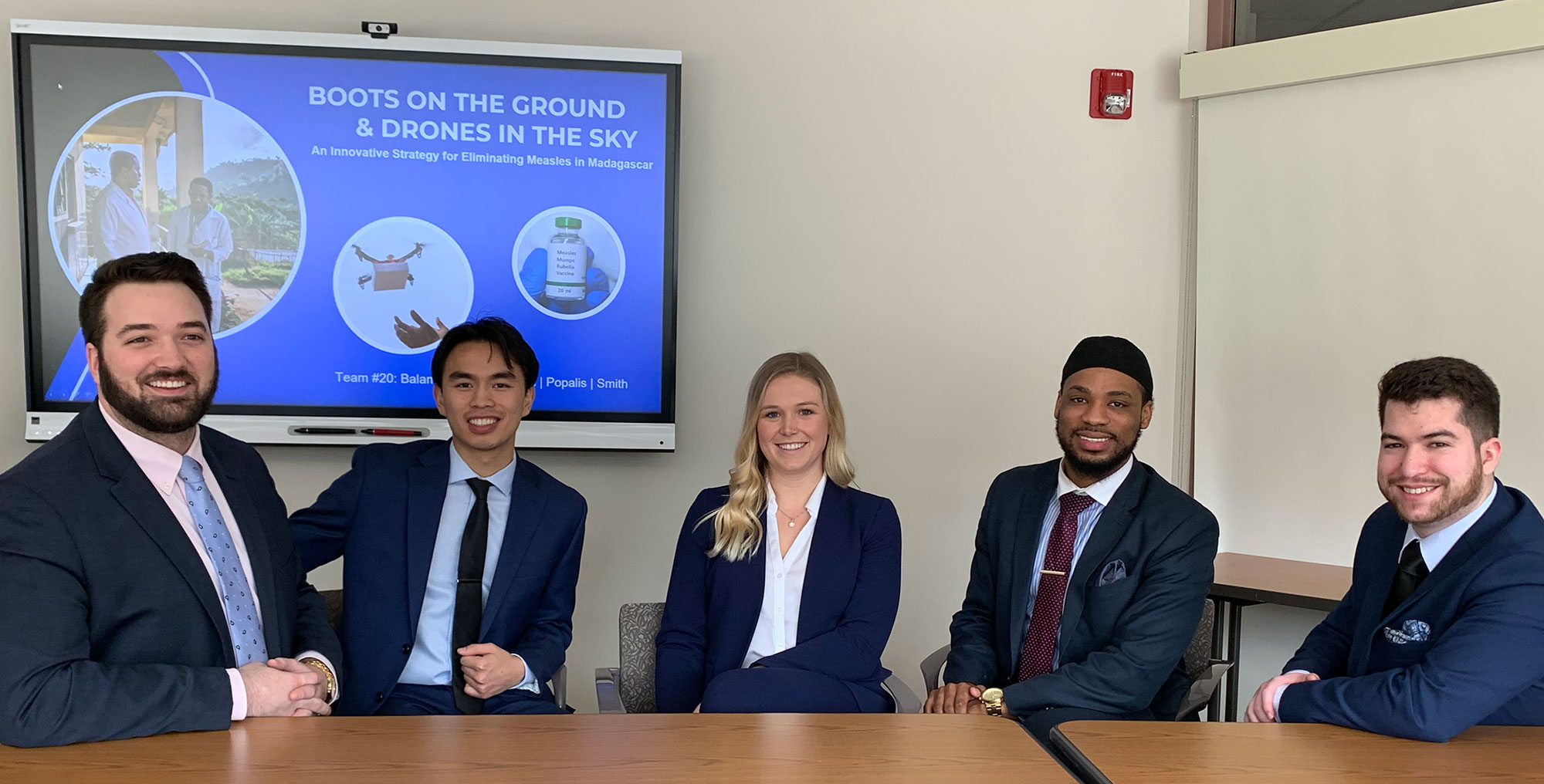Amid COVID-19 outbreak, Penn State competes in virtual global health competition

The coronavirus disease 2019 (COVID-19) outbreak provided a real-life learning experience for an interdisciplinary team of Penn State advanced-degree students who were preparing to participate in the International Emory Global Health Case Competition in Atlanta.
The annual event provides university teams from across the world an opportunity to address a hypothetical public health crisis. In a serious yet appropriate twist, as COVID-19 became a public health emergency, this year’s competition was forced to shift from an in-person format to a virtual event.
The Penn State team, comprising Jacob Balamut, Pierce Curran, Chandat Phan, Madyson Popalis and Michael Smith Jr., competed against 30 universities on March 14.
For the competition, each group presented a comprehensive proposal for eradicating measles in one of the following locations: India, Madagascar, Nigeria, Syria or Ukraine. Building on their experiences in public health, medicine and law, the students from Penn State College of Medicine and Penn State Dickinson Law developed a plan for Madagascar that would utilize drones and community health workers to combat measles and prevent future outbreaks.
“The process of formulating a proposal to combat real and imagined global health crises has been incredibly rewarding,” said Curran, a Penn State MD student and the team’s captain. “I hope that the lessons I’ve learned from this experience will be put to good use in the future as a physician practicing globally.”
“I am thankful to be a part of this integrative learning experience,” said Smith, a Penn State Master of Public Health (MPH) student. “It is experiences like this that allows for one to comprehensively understand the nuances of health care delivery, while being cognizant of health disparities, structural violence, environmental disadvantages, and social determinants of health that greatly affect people who are too often marginalized.”
This marks the third consecutive year that Penn State has participated in the event coordinated by Rollins School of Public Health at Emory University. This time, Penn State went head-to-head against several universities who developed plans for Madagascar including Emory University, who ended up ultimately winning the entire competition.
Coupled with the expertise they acquired while preparing for the competition and what they witnessed unfolding in real-time with COVID-19, the Penn State team embraced this all-important learning experience.
“Given the current global climate, the interaction of law, medicine, and public health is critically important,” said Balamut, a Juris Doctorate (JD) student at Penn State Dickinson Law. “Though we didn’t win, I’m happy with the innovative solution we crafted and our overall presentation.”
“I thought that the global health case competition was a great experience that really pulled on my coursework and background in public health,” said Popalis, an MPH student. “It was great to be able to apply different skills to solving a real-world problem and work as a team to create an interdisciplinary solution. Collaborative interventions are the key to a successful global health program in the competition, and also in real life.”
Each team had 20 minutes, which included a presentation and a Q&A session with judges. Proposals were judged based on creativity and innovation; clarity and organization; rationale for strategies proposed; presentation delivery; and sustainability. In addition to Emory securing the top spot, teams from the University of Melbourne, Yeshiva University, University of Virginia and University of Texas Southwestern secured second- through fifth-place honors.
“I want global health to be a big part of my career and working alongside this team really helped me see what that future could look like,” said Phan, an MD student. “In class, we learn about disease processes and how to treat them. But the case competition gave me the opportunity to grapple with real world health issues that affect whole populations of people.”
If you're having trouble accessing this content, or would like it in another format, please email the Penn State College of Medicine web department.
